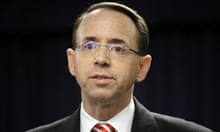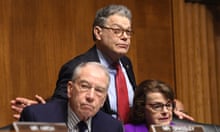Who is Jeff Sessions?
Jefferson Beauregard Sessions is a four-term junior senator from Alabama who, before being elected to that office in 1996, served as attorney general for the state. Sessions is a conservative Republican who is anti-abortion, anti-immigration, skeptical of climate change and hostile to same-sex marriage. On issues of criminal justice, Sessions has championed “law and order”, stern marijuana prohibition and the unregulated use of civil forfeiture by law enforcement.
Why did Donald Trump nominate him as attorney general?
After passing over some more well-known rumored contenders such as New Jersey governor Chris Christie and former New York mayor Rudy Giuliani, Trump picked Sessions, calling him “a world-class legal mind”. Trump continued in his statement: “Jeff is greatly admired by legal scholars and virtually everyone who knows him.”
Sessions’ reputation as a hard-nosed proponent of “law and order” likely endeared him to Trump, as this kind of tough rhetoric was a major part of the president’s campaign message. This is a direct rebuke to the national and local trend of “smart on crime” efforts like those supported by former attorney generals Eric Holder and Loretta Lynch, to ease some of the most draconian practices of the criminal justice system. Sessions’ early support for instituting some kind of ban on Muslim immigration and for a border wall with Mexico likely helped his case.
Trump has also repeatedly expressed the high value he places on the praise and loyalty of others, and it’s likely that Sessions’ early and fervent support of Trump’s candidacy helped him pull out in front of alternative contenders.
Trump's cabinet
Confirmed
James Mattis (Defense), John Kelly (Homeland Security), Rex Tillerson (State), Elaine Chao (Transportation), Nikki Haley (United Nations), Betsy DeVos (Education), Jeff Sessions (Attorney General), Tom Price (Health and Human Services), Steve Mnuchin (Treasury), David Shulkin (Veterans Affairs), Scott Pruitt (Environmental Protection Agency), Wilbur Ross (Commerce), Ryan Zinke (Interior), Rick Perry (Energy), Ben Carson (Housing and Urban Development), Sonny Perdue (Agriculture), Alexander Acosta (Labor)
Awaiting Senate approval
Linda McMahon (Small Business Association), Mick Mulvaney (Office of Management and Budget director), Robert Lighthizer (US trade representative)
Withdrawn
Andrew Puzder (Labor)
Not yet announced
Council of Economic Advisers chair
How likely is it that Sessions will be confirmed this week?
Sessions’ nomination made its way out of committee last week and, given the current makeup of the Senate, with Republicans in control of a slim 52-48 majority (one of whom is Sessions himself), appears to be a shoo-in for confirmation. This is despite a fast-growing petition to halt his confirmation that has received over 1 million signatures.
Unlike controversial education secretary Best DeVos’ confirmation, which saw two Republican defectors, forcing Vice-President Mike Pence to cast a tie-breaking vote, no GOP members have expressed any objection to their colleague Sessions. Indeed, the senator may earn votes from across the aisle, as conservative Democrat Joe Manchin has already expressed his support, calling Sessions “a friend”. Others could follow.
Why didn’t Sessions become a federal judge in the 1980s?
In 1986, Ronald Reagan nominated Sessions, then a US district attorney, to a federal judgeship. Sessions’ confirmation hearing failed to make it out of committee, an extremely rare occurrence, after concerns were raised about Sessions’ attitude towards race. Leading the charge against Sessions were then senators Joe Biden and Ted Kennedy.
In those hearings, J Gerald Hebert, a former justice department civil rights attorney who worked with Sessions in Alabama, testified that Sessions had dismissed organisations such as the NAACP and the ACLU as “un-American” and suggested a white civil rights attorney was a race traitor for taking on a voting rights case in Alabama during the 1980s.
Senators also heard that Sessions had referred to a black official in his US attorney’s office as “boy” and told him to be careful what he said to white people. He denies this but has admitted to having once said he admired the KKK until he found out they smoked marijuana, calling the comment a joke.
Why have so many civil rights groups come out in opposition to Sessions’ nomination?
The NAACP and the web-based Color of Change network are just a few of the dozens of civil rights organizations that have publicly lobbied against Sessions’ confirmation.
A fair amount of racial controversy has followed Sessions throughout his career. Beyond the testimony of attorney Herbert, the Guardian recently revealed another incident where a different black colleague accused Sessions of using the N-word in one incident and generally being hostile to other black Americans in the department. Sessions denied using the word, although he gave a false explanation to the US Senate when testifying about the allegation.
Sessions also indicted activists working to help elderly black Alabamians in the 1980s, raising charges of racist voter suppression. Coretta Scott King, Martin Luther King Jr’s widow, was so concerned about Sessions’ possible appointment back in 1986 that she wrote a letter to the Senate subcommittee which read in part:
“Mr Sessions has used the awesome powers of his office in shabby attempt to intimidate and frighten elderly black voters. For this reprehensible conduct, he should not be rewarded with a federal judgeship.”
It was this letter that Senator Elizabeth Warren was attempting to read in the Senate on Tuesday night when she was formally rebuked by Senate Republicans and “silenced” by procedural rules stating that senators cannot impugn their colleagues on the Senate floor, an act that some felt was an abuse.
That's the key point. Rules against criticizing other Senators cannot apply when you are DEBATING THE NOMINATION OF A SENATOR! https://t.co/mLQqP7z14d
— Chris Murphy (@ChrisMurphyCT) February 8, 2017
What does Sessions’ confirmation mean for criminal justice reform?
The outlook for criminal justice reform is dim with Sessions’ ascension to the office of the nation’s top law enforcer. Sessions has called for a slowing of the recent trend towards reducing prison populations through clemency and more lenient sentencing. Several DoJ initiatives, for example ex-attorney general Eric Holder’s “smart on crime” reforms, seem vulnerable to a more punitive mindset under Sessions. “The wise approach is to slow down and evaluate the trends before accelerating prison population decline,” Sessions said in opposition to a bipartisan sentencing reform bill that would have decreased mandatory minimum sentencing, including for nonviolent drug crimes.
A Sessions-led DoJ will also likely be less inclined to embark on civil rights investigations into police departments and their patterns and practices. These are the types of investigations that sparked the famous “Ferguson Report” and a handful of other consent decrees and “collaborative reform” endeavors aimed at curbing the systemic violations of civil rights that are endemic under some police departments. Sessions said during his confirmation hearing that he would be willing to consider “withdrawal or modification” of agreements between the DoJ and police departments consummated by his predecessors which he said tend to “undermine respect for our police officers”.









